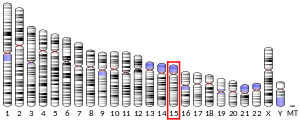MORF4L1
Mortality factor 4-like protein 1 is a protein that in humans is encoded by the MORF4L1 gene.[5][6][7]
Interactions
[edit]MORF4L1 has been shown to interact with MYST1,[8] Retinoblastoma protein[8][9] and MRFAP1.[8][9]
References
[edit]- ^ a b c GRCh38: Ensembl release 89: ENSG00000185787 – Ensembl, May 2017
- ^ a b c GRCm38: Ensembl release 89: ENSMUSG00000062270 – Ensembl, May 2017
- ^ "Human PubMed Reference:". National Center for Biotechnology Information, U.S. National Library of Medicine.
- ^ "Mouse PubMed Reference:". National Center for Biotechnology Information, U.S. National Library of Medicine.
- ^ Andersson B, Wentland MA, Ricafrente JY, Liu W, Gibbs RA (Apr 1996). "A "double adaptor" method for improved shotgun library construction". Analytical Biochemistry. 236 (1): 107–13. doi:10.1006/abio.1996.0138. PMID 8619474.
- ^ Yu W, Andersson B, Worley KC, Muzny DM, Ding Y, Liu W, Ricafrente JY, Wentland MA, Lennon G, Gibbs RA (Apr 1997). "Large-scale concatenation cDNA sequencing". Genome Research. 7 (4): 353–8. doi:10.1101/gr.7.4.353. PMC 139146. PMID 9110174.
- ^ "Entrez Gene: MORF4L1 mortality factor 4 like 1".
- ^ a b c Pardo PS, Leung JK, Lucchesi JC, Pereira-Smith OM (Dec 2002). "MRG15, a novel chromodomain protein, is present in two distinct multiprotein complexes involved in transcriptional activation". The Journal of Biological Chemistry. 277 (52): 50860–6. doi:10.1074/jbc.M203839200. PMID 12397079.
- ^ a b Leung JK, Berube N, Venable S, Ahmed S, Timchenko N, Pereira-Smith OM (Oct 2001). "MRG15 activates the B-myb promoter through formation of a nuclear complex with the retinoblastoma protein and the novel protein PAM14". The Journal of Biological Chemistry. 276 (42): 39171–8. doi:10.1074/jbc.M103435200. PMID 11500496.
Further reading
[edit]- Doyon Y, Côté J (Apr 2004). "The highly conserved and multifunctional NuA4 HAT complex". Current Opinion in Genetics & Development. 14 (2): 147–54. doi:10.1016/j.gde.2004.02.009. PMID 15196461.
- Pena AN, Pereira-Smith OM (Apr 2007). "The role of the MORF/MRG family of genes in cell growth, differentiation, DNA repair, and thereby aging". Annals of the New York Academy of Sciences. 1100 (1): 299–305. Bibcode:2007NYASA1100..299P. doi:10.1196/annals.1395.031. PMID 17460191. S2CID 12635963.
- Bertram MJ, Bérubé NG, Hang-Swanson X, Ran Q, Leung JK, Bryce S, Spurgers K, Bick RJ, Baldini A, Ning Y, Clark LJ, Parkinson EK, Barrett JC, Smith JR, Pereira-Smith OM (Feb 1999). "Identification of a gene that reverses the immortal phenotype of a subset of cells and is a member of a novel family of transcription factor-like genes". Molecular and Cellular Biology. 19 (2): 1479–85. doi:10.1128/mcb.19.2.1479. PMC 116076. PMID 9891081.
- Zhang QH, Ye M, Wu XY, Ren SX, Zhao M, Zhao CJ, Fu G, Shen Y, Fan HY, Lu G, Zhong M, Xu XR, Han ZG, Zhang JW, Tao J, Huang QH, Zhou J, Hu GX, Gu J, Chen SJ, Chen Z (Oct 2000). "Cloning and functional analysis of cDNAs with open reading frames for 300 previously undefined genes expressed in CD34+ hematopoietic stem/progenitor cells". Genome Research. 10 (10): 1546–60. doi:10.1101/gr.140200. PMC 310934. PMID 11042152.
- Leung JK, Berube N, Venable S, Ahmed S, Timchenko N, Pereira-Smith OM (Oct 2001). "MRG15 activates the B-myb promoter through formation of a nuclear complex with the retinoblastoma protein and the novel protein PAM14". The Journal of Biological Chemistry. 276 (42): 39171–8. doi:10.1074/jbc.M103435200. PMID 11500496.
- Yochum GS, Ayer DE (Nov 2002). "Role for the mortality factors MORF4, MRGX, and MRG15 in transcriptional repression via associations with Pf1, mSin3A, and Transducin-Like Enhancer of Split". Molecular and Cellular Biology. 22 (22): 7868–76. doi:10.1128/MCB.22.22.7868-7876.2002. PMC 134742. PMID 12391155.
- Pardo PS, Leung JK, Lucchesi JC, Pereira-Smith OM (Dec 2002). "MRG15, a novel chromodomain protein, is present in two distinct multiprotein complexes involved in transcriptional activation". The Journal of Biological Chemistry. 277 (52): 50860–6. doi:10.1074/jbc.M203839200. PMID 12397079.
- Cai Y, Jin J, Tomomori-Sato C, Sato S, Sorokina I, Parmely TJ, Conaway RC, Conaway JW (Oct 2003). "Identification of new subunits of the multiprotein mammalian TRRAP/TIP60-containing histone acetyltransferase complex". The Journal of Biological Chemistry. 278 (44): 42733–6. doi:10.1074/jbc.C300389200. PMID 12963728.
- Tominaga K, Leung JK, Rookard P, Echigo J, Smith JR, Pereira-Smith OM (Dec 2003). "MRGX is a novel transcriptional regulator that exhibits activation or repression of the B-myb promoter in a cell type-dependent manner". The Journal of Biological Chemistry. 278 (49): 49618–24. doi:10.1074/jbc.M309192200. PMID 14506250.
- Doyon Y, Selleck W, Lane WS, Tan S, Côté J (Mar 2004). "Structural and functional conservation of the NuA4 histone acetyltransferase complex from yeast to humans". Molecular and Cellular Biology. 24 (5): 1884–96. doi:10.1128/MCB.24.5.1884-1896.2004. PMC 350560. PMID 14966270.
- Tominaga K, Magee DM, Matzuk MM, Pereira-Smith OM (Oct 2004). "PAM14, a novel MRG- and Rb-associated protein, is not required for development and T-cell function in mice". Molecular and Cellular Biology. 24 (19): 8366–73. doi:10.1128/MCB.24.19.8366-8373.2004. PMC 516751. PMID 15367658.
- Wan D, Gong Y, Qin W, Zhang P, Li J, Wei L, Zhou X, Li H, Qiu X, Zhong F, He L, Yu J, Yao G, Jiang H, Qian L, Yu Y, Shu H, Chen X, Xu H, Guo M, Pan Z, Chen Y, Ge C, Yang S, Gu J (Nov 2004). "Large-scale cDNA transfection screening for genes related to cancer development and progression". Proceedings of the National Academy of Sciences of the United States of America. 101 (44): 15724–9. Bibcode:2004PNAS..10115724W. doi:10.1073/pnas.0404089101. PMC 524842. PMID 15498874.
- Andersen JS, Lam YW, Leung AK, Ong SE, Lyon CE, Lamond AI, Mann M (Jan 2005). "Nucleolar proteome dynamics". Nature. 433 (7021): 77–83. Bibcode:2005Natur.433...77A. doi:10.1038/nature03207. PMID 15635413. S2CID 4344740.
- Cai Y, Jin J, Florens L, Swanson SK, Kusch T, Li B, Workman JL, Washburn MP, Conaway RC, Conaway JW (Apr 2005). "The mammalian YL1 protein is a shared subunit of the TRRAP/TIP60 histone acetyltransferase and SRCAP complexes". The Journal of Biological Chemistry. 280 (14): 13665–70. doi:10.1074/jbc.M500001200. PMID 15647280.


 French
French Deutsch
Deutsch






